ISLAMABAD: Prime Minister Shehbaz Sharif will visit China in May to restore Beijing’s confidence in Islamabad with regard to various projects, Pakistani state media reported on Saturday, citing a senior official.
Beijing is investing over $65 billion in energy and infrastructure projects in Pakistan as part of China-Pakistan Economic Corridor (CPEC), a major segment of its Belt and Road Initiative designed to give China a shorter, more secure trading route to the Middle East and beyond, while also boosting Pakistan’s economy.
Since its initiation in 2013, CPEC has seen tens of billions of dollars funnelled into massive transport, energy and infrastructure projects. But the undertaking has also been hit by Pakistan struggling to keep up its financial obligations as well as attacks on Chinese targets by militants.
Rana Mashhood, chairman of Prime Minister’s Youth Program, said PM Sharif wanted to make Pakistan a partner in economic development, which was why he was striving to bring investment from Pakistan’s friendly countries.
“From May 14, the Prime Minister will make an official visit to the People’s Republic of China, which will restore the confidence of the brotherly neighboring country and the CPEC project will move toward success quickly,” Mashhood was quoted as saying by the state-run APP news agency.
The comments came during his visit to China Window, a Chinese cultural center, in the northwestern Pakistani city of Peshawar. On the occasion, Mashhood visited different galleries at the center, signed the friendship wall and recorded his comments in the visitor’s book.
Beijing has been one of Islamabad’s most reliable foreign partners in recent years, readily providing financial assistance to bail out its often-struggling neighbor. In July last year, China granted Pakistan a two-year rollover on a $2.4 billion loan, giving the debt-saddled nation much-needed breathing space as it tackled a balance-of-payments crisis.
But ties have been strained by numerous hurdles in recent years, including scaled-back CPEC projects and attacks on Chinese workers in Pakistan. In the latest attack, five Chinese nationals and their Pakistani driver were killed in a suicide bombing in northwest Pakistan on March 26.
Mashhood appreciated the establishment of the Chinese cultural center in Peshawar and said it would be a pivotal hub for further enhancing the bond between Pakistan and China, according to the APP report.
Recognizing the importance of foreign languages for the country’s youth, the official said he had instructed relevant institutions to initiate language programs tailored to meet the diverse needs of different countries.
“He specifically mentioned plans to include the Chinese language in the programs offered by the National Commission for Technical and Vocational Training,” the report read.
Pakistan PM Shehbaz Sharif to visit China in May — state media
https://arab.news/6crrh
Pakistan PM Shehbaz Sharif to visit China in May — state media
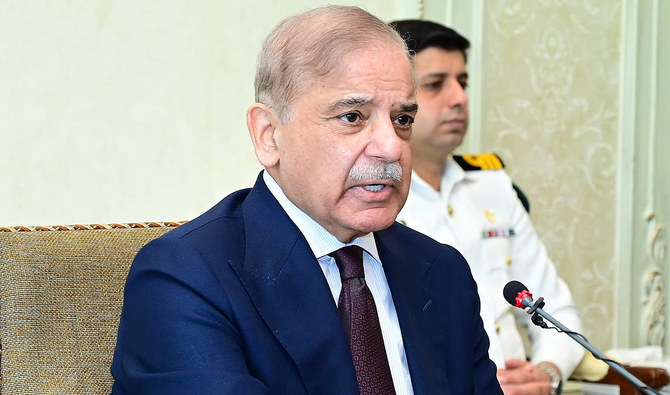
- The development comes amid efforts to restore China’s confidence in Islamabad regarding various projects
- Scaled-back CPEC projects, attacks on Chinese nationals have lately strained ties between the two countries
Police disperse Lahore lawyer protest with tear gas, batons over court relocation

- Clashes broke out when lawyers tried to remove police barriers and tried to enter the Lahore High Court
- Police say they used tear gas, batons and water cannons after lawyers started throwing stones at them
ISLAMABAD: Police in Pakistan’s eastern city of Lahore used tear gas and batons on Wednesday to disperse hundreds of lawyers protesting the relocation of civil courts in Model Town, with live images of the clashes broadcast by local news channels.
The Lahore Bar Association, which organized the protest, also criticized authorities for registering terrorism cases against its members in an attempt to silence dissent.
As the demonstration unfolded in front of the Lahore High Court, lawyers attempted to remove barriers set up by the police to enter the building.
The police responded with tear gas, batons and water cannons, arresting dozens of lawyers.
Speaking to Pakistan’s Geo News channel, Deputy Inspector General (DIG) Faisal Kamran stated that while law enforcement showed restraint, they would not permit any breaches of the law.
“The police are demonstrating maximum patience and restraint,” he said, noting they only used tear gas after lawyers threw stones at them.
He added that one station house officer and one constable were injured.
Protests by lawyers are relatively common in Pakistan and have been a notable aspect of the country’s political and social landscape. These protests can be sparked by a variety of issues ranging from judicial appointments and legal reforms to specific grievances related to court administration and the treatment of lawyers themselves.
Local news channels reported the clashes in Lahore disrupted traffic, creating inconvenience for commuters on The Mall and surrounding areas.
Amid investment push, Uzbek foreign minister in Pakistan to discuss trade, regional connectivity
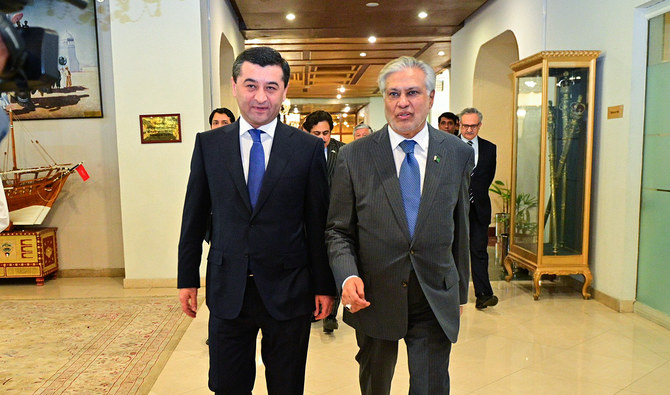
- The government has been hosting official and business delegations to address the economic challenges faced by the country
- Pakistan is interested in reliable Central Asian energy sources and sees Uzbekistan as gateway to other markets in the region
ISLAMABAD: Uzbekistan’s Foreign Minister Bakhtiyor Saidov arrived in Pakistan for a two-day visit on Tuesday night to discuss bilateral trade and regional connectivity, confirmed a brief statement circulated by the foreign office, as the administration in Islamabad is trying to bolster economic ties amid financial challenges.
A Saudi business delegation recently concluded its visit to the country where its members held a series of business-to-business meetings to explore investment opportunities across various sectors during their visit.
This was followed by a meeting between Prime Minister Shehbaz Sharif and Japanese industrialists, where the PM encouraged them to invest in Pakistan’s electric automotive industry. Similarly, Federal Minister for Finance Muhammad Aurangzeb engaged with international investors, assuring them of the country’s commitment to create an enabling business environment. The impending visit of Saudi Crown Prince Mohammed bin Salman, expected this month, is anticipated to bring several billion dollars in investments.
The Uzbek foreign minister’s trip also highlights the strengthening bilateral relations between the two states and aligns with Pakistan’s objectives of enhancing regional connectivity for greater economic prosperity.
“Foreign Minister Saidov will call on Prime Minister Muhammad Shehbaz Sharif and hold in-depth talks with Deputy Prime Minister and Foreign Minister Mohammad Ishaq Dar on a wide range of bilateral issues of mutual interest, with special focus on trade and connectivity,” the foreign office said in a statement released before his arrival.
“The visit of the Foreign Minister of Republic of Uzbekistan is expected to provide fresh impetus to the friendly relations between the two countries,” it added.
Pakistan views Central Asian countries as crucial partners in enhancing regional trade and energy security.
The region’s vast natural resources, especially oil and gas, can be vital for Pakistan to secure reliable energy sources and diversify its energy imports.
Uzbekistan plays a key role in this equation due to its geographical position and resources, acting as a gateway for Pakistan to access other markets in the region.
Last year, Pakistan’s former caretaker prime minister Anwar-ul-Haq Kakar visited the Central Asian country to participate in an Economic Cooperation Organization (ECO) meeting where he reiterated his country’s commitment to regional cooperation and economic integration.
Pakistan invites China to establish industrial zones for electric car manufacturing
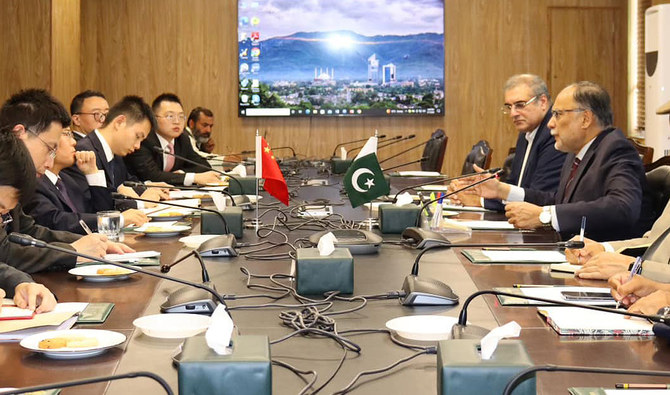
- Earlier this year, Pakistani car maker Sazgar Engineering unveiled electric car made in collaboration with China
- Road transport is significant contributor to pollution as around 23 percent of Pakistan’s greenhouse gases come from vehicles
ISLAMABAD: Pakistan’s planning minister has invited China to collaborate with Islamabad in setting up industrial zones to manufacture electric cars amid a renewed push to attract foreign investment, state news agency APP reported on Wednesday.
The government of Pakistan approved an ambitious National Electric Vehicles Policy (NEVP) in 2019 with the goal of electric vehicles comprising 30 percent of all passenger vehicle and heavy-duty truck sales by 2030, and an even more ambitious target of 90 percent by 2040. For two- and three-wheelers, as well as buses, the policy set a goal of achieving 50 percent of new sales by 2030 and 90 percent by 2040.
In a meeting with Chinese officials on Tuesday, Planning Minister Ahsan Iqbal invited them to collaborate on the production of electric cars.
“He emphasized Pakistan’s aim to establish industrial zones for the manufacturing of electric cars in collaboration with China, leveraging Pakistan’s competitive advantage to reduce overall production costs and create employment opportunities for Pakistani workers,” APP reported.
Earlier this year, Sazgar Engineering, one of Pakistan’s leading car manufacturers, unveiled the electric vehicle “ORA 3,” manufactured in collaboration with Chinese car manufacturer Great Wall Motors (GWM).
The urban areas of Pakistan exhibit some of the world’s highest levels of air pollution, primarily due to sub-2.5 μm particulate emissions. This issue significantly impairs both the country’s economy and the quality of life of its residents. Road transport is a significant contributor to air pollution as around 23 percent of Pakistan’s greenhouse gas emissions originate from vehicles.
On Tuesday, Prime Minister Shehbaz Sharif also met a delegation of Japanese industrialists in Islamabad and invited them to invest in Pakistan’s electric automotive industry.
“There is a wide potential for investment in the electric vehicle industry in Pakistan and Japanese companies with the best technology can take full advantage of it,” Sharif told the Japanese group.
Pakistan court orders Imran Khan’s wife to be moved from house arrest to Adiala Prison
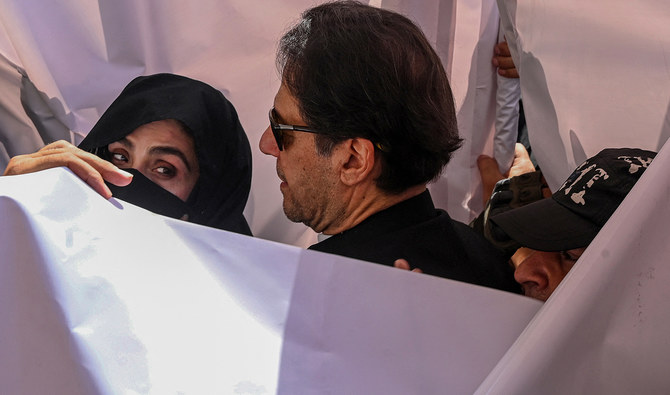
- Bushra Bibi had petitioned court to shift her from Bani Gala home to Adiala Jail where Khan is also imprisoned
- Bushra has been handed two sentences, 14 years in graft case and 7 years for violating Pakistan’s marriage law
ISLAMABAD: The Islamabad High Court (IHC) on Thursday ordered that ex-premier Imran Khan’s wife Bushra Bibi be transferred from her Banigala residence, declared a sub-jail, to Adiala Jail, where her husband is incarcerated.
Bushra has been living under house arrest at her husband’s sprawling Bani Gala mansion in Islamabad since Jan. 31 when both were sentenced to 14 years in prison in a case that relates to accusations they undervalued gifts from a state repository and gained profits from selling them while Khan was prime minister from 2018-22. Khan is jailed at Rawalpindi’s Adiala Jail.
In February, Khan and his wife were also sentenced to seven years on charges they violated the country’s marriage law when they wed in 2018 — the fourth sentence for Khan and the second for his wife.
Bushra had petitioned the court several months ago that she should be moved to Adiala and the IHC had reserved its verdict in the case on May 2.
“Court has annulled notification of house arresting former first lady Bushra Bibi at Bani Gala sub-prison and ordered her transfer to Adiala Prison,” Khan’s Pakistan Tehreek-e-Insaf political party said in a message to reporters.
During Thursday’s hearing when the court reserved its judgment, Bushra’s lawyer Usman Gill said after her sentencing in the state repository case by the trial court, his client went to Adiala Jail as per the trial court order which was also forwarded to the jail superintendent. But on the orders of the interior ministry, the chief commissioner issued an “illegal notification for transfer” to Bani Gala, the lawyer argued.
“There was no instruction from the authorities concerned regarding the transfer from Adiala Jail to Banigala,” he said.
“Neither the provincial government nor did the Punjab prisons inspector general issue any such directive [for transfer] … The place of imprisonment was to be determined by the trial court and not the chief commissioner.”
The state’s counsel argued that Bushra was moved to Bani Gala because of security threats.
“Were the 141 women who were brought to Adiala after Bushra less privileged?” the judge hearing the case asked, saying they too should be imprisoned at their homes then.
“Sometimes you say that [you] cannot present her [Bushra] in the court as there are threats and at times, you say that the jail is not secure. Are you secure?” the judge quipped. “If I am confined in my home by my own will, I would be very happy but how can a prisoner’s property be turned into a sub-jail against his will?”
The IHC subsequently reserved its verdict on the petition.
CASES
In a separate petition to the court filed last month, Bushar, a deeply religious woman widely believed to be Khan’s spiritual guide, alleged she was being poisoned through contaminated food and subjected to “mental and physical torture which is becoming a serious threat to her health and life.” She also alleged that her room and bathroom had been bugged and multiple hidden cameras installed in a “blatant violation of her privacy, dignity and honor.”
The petition said Bushra was only given ten minutes for meetings with family members and lawyers, with five jail staff supervising at all times.
Khan was first jailed after being handed a three-year prison sentence in August 2023 by the Election Commission for not declaring assets earned from selling gifts worth more than 140 million rupees ($501,000) in state possession and received during his premiership. In January, Khan and Bushra were handed 14-year jail terms following a separate investigation by the country’s top anti-graft body into the same charges involving state gifts.
An anti-graft court in Islamabad also handed Khan a 10-year jail term in January for revealing state secrets, a week before national elections on Feb. 8. The ruling on his marriage to Bushra and a seven-year sentence each for both also came ahead of the polls.
Khan has also been indicted under Pakistan’s anti-terrorism law in connection with violence against the military that erupted following his brief arrest related to the Al-Qadir case on May 9. A section of Pakistan’s 1997 anti-terrorism act prescribes the death penalty as maximum punishment. Khan has denied the charges under the anti-terrorism law, saying he was in detention when the violence took place.
Khan’s convictions, which mean he is banned from holding public office, ruled the 71-year-old out of the February general elections. Arguably Pakistan’s most popular politician, Khan says all cases against him are motivated to keep him out of politics.
Taliban reject Pakistan’s claim Afghan bomber involved in deadly attack on Chinese dam engineers
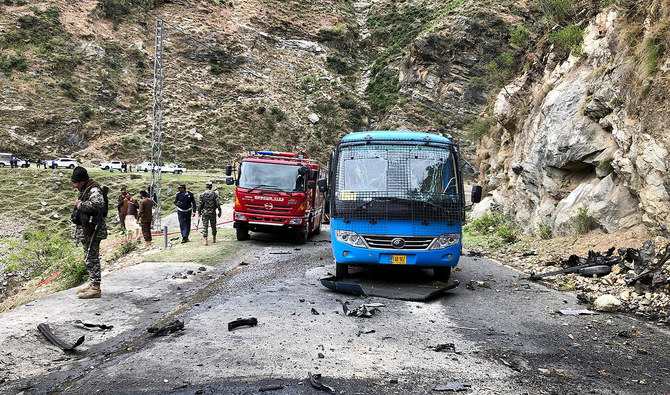
- Afghan defense ministry says the killings of Chinese nationals reflected the weakness of Pakistan’s security agencies
- Pakistan believes Kabul not doing enough to tackle militant groups, launched airstrikes targeting them in Afghanistan
KABUL: The Taliban defense ministry on Wednesday rejected Pakistan’s allegations that Afghans were involved in an attack on Chinese engineers, as ties between the neighboring nations sour amidst rising insecurity.
Pakistan’s military had said at a press conference on Tuesday that a suicide bomb attack in March in Pakistan’s northern Khyber Pakhtunkhwa province, that killed five Chinese engineers, was planned in neighboring Afghanistan, and that the bomber was an Afghan national.
“Afghans are not involved in such matters,” said Mufti Enayatullah Khorazmim, the spokesperson for Afghanistan’s Taliban-run Ministry of National Defense.
“Blaming Afghanistan for such incidents is a failed attempt to divert attention from the truth of the matter and we strongly reject it,” he added.
A suicide bomber rammed a vehicle into a convoy of Chinese engineers working on a dam project in northwest Pakistan in March, killing six people.
“The killing of Chinese citizens in an area of Khyber Pakhtunkhwa that is under tight security cover by the Pakistan Army shows the weakness of the Pakistani security agencies,” Khorazmim said.
Relations between Pakistan and Afghanistan have soured in recent months. Islamabad says Kabul is not doing enough to tackle militant groups targeting Pakistan and in March Pakistan carried out airstrikes targeting militants on Afghan territory.
Last year, Pakistan expelled nearly 370,000 undocumented Afghan nationals, saying the majority of suicide attacks against its security forces were carried out by Afghans, a charge Kabul rejected.
Pakistan’s military spokesman said on Tuesday that security for 29,000 Chinese nationals in Pakistan, many of them working on infrastructure projects, was the top priority for security institutions.
The Taliban are also seeking economic ties with China, the first country to formally appoint an ambassador to Kabul under the Taliban, and wish to join China-Pakistan Economic Corridor (CPEC), which is Beijing’s $65 billion investment in development and infrastructure.










